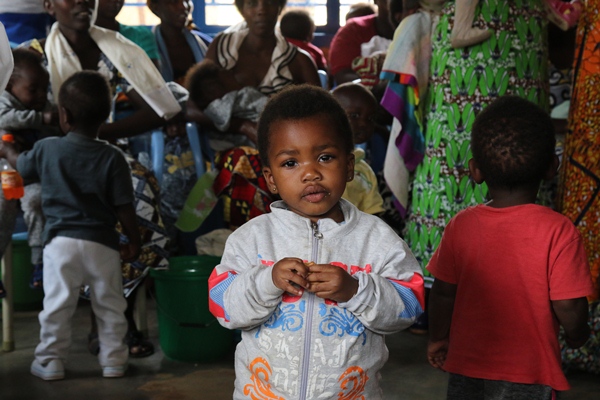
Supplementary nutrition Kiziba camp (Photo : WFP)
Today, the World Food Programme (WFP) announced it would reduce food assistance to refugees in Rwanda by a dramatic 60 percent, as of March 2021. Some 135,000 Burundian and Congolese refugees in camps in Rwanda rely on humanitarian assistance to meet their basic food needs each month.
“This is a desperate situation and, without an immediate response from donors, we simply have no choice but to reduce our assistance to the refugees,” said WFP Country Director Edith Heines. “While WFP appreciates the support received so far, we are urgently appealing to donors to quickly come to the aid of the refugees and provide additional funding so that we can return to full rations and avoid any prolonged negative impacts.”
WFP provides refugees with a monthly cash transfer to buy food in local markets. Each person receives RWF 7,600 (US$ 7.72) under a full ration allocation, which provides the basic foods to meet minimum nutrition requirements for that person.
WFP requires US$ 9 million to avert ration reductions from March through June 2021, and US$ 20.6 million to continue full assistance to refugees throughout 2021. If no new funding is received, deeper reductions will be necessary in the coming months.
Despite the reductions, WFP will maintain full rations of targeted nutrition support to refugees identified as particularly vulnerable, such as children under two years, schoolchildren, and pregnant and nursing mothers, as well as people living with HIV and tuberculosis patients under treatment. A total of 51,000 refugees including 37,000 schoolchildren are being assisted.
This comes at a time when many refugees have been particularly hard hit by the impacts of the COVID-19 pandemic. WFP data from June and November 2020 noted an increased reliance on external aid among refugees since the onset of the pandemic.
Ration reductions are likely to cause widespread food insecurity and potentially lead to increased tensions within the refugee community. In late 2017 through mid-2018, WFP was forced to reduce rations by twenty-five percent due to funding shortfalls. A WFP survey in 2018 found that as a result the percentage of refugee families with poor household eating habits doubled.
In 2021, the United Nations Refugee Agency (UNHCR) and WFP are jointly moving towards needs-based humanitarian assistance instead of the current blanket assistance for refugees. This exercise will further allow scarce donor resources to be prioritized for the most vulnerable. The strategy will also strive to create more access to livelihood opportunities for refugees.
“This new approach will allow us to prioritise funding and focus on those refugees who need our help the most,” said Heines. “But in order for it to be successful, the refugee operation must be fully supported at this critical stage to ensure we have the support of the refugee community as we transition to this new way of programming.”
The Comprehensive Refugee Response Framework (CRRF) outlines a commitment of the international community to meet the immediate humanitarian needs of the refugees to ease the burden on Rwanda. Additional support is needed to support the host government and its goodwill and to not undermine developmental gains. (End)
